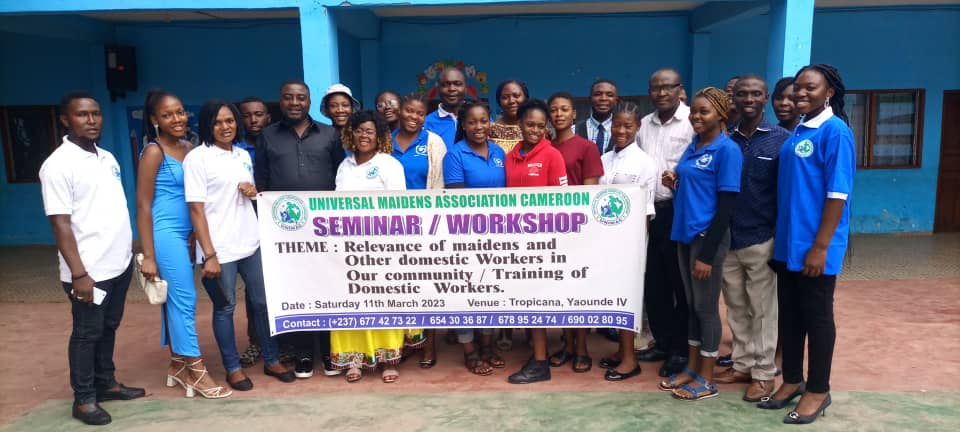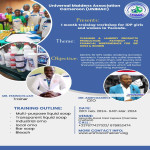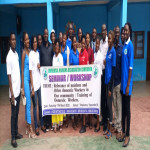1-
Introduction
On the 11th of March 2023, a seminar and workshop was held by Universal Maidens Association Cameroon abbreviated UNIMAC, at Yaounde, inside Lady Bird Academy School complex located at Mvan Tropicana, opposite Ndi Samba University. It started at 9.00 am and ended at 6.00 pm with the presence of fifty (50) participants.
UNIMAC is a non-profit organization whose declaration receipt was signed in Bamenda on 29 of October 2021 (see a copy in the annex of this report).
Its objectives is to bring together all maidens of Cameroon into a united force and contribute to efforts aimed at improving their living and working conditions; to promote and encourage the creation of training centers for maidens where they are properly trained and educated on how to carry out their work; to ameliorate the social status of maidens in Cameroon; provide support and counseling to youth who desire to develop their talents in the field of work and advocate to improve access to good working conditions; to raise awareness, educate and sensitize the population on the role of maidens play in the development of the country and advocate for their respect;…
It is therefore in the same line with the main objectives stated above that the seminar was held in Yaounde for the first time, after the one that took place in Bamenda on Saturday the 19th 2022.
2-
Highlight of the seminar
It started at 9.00 am with an opening prayer and the execution of the
national anthem by those present (see the program attached in annex).
The CEO then took the floor to wish everybody a warmful welcome to the
seminar. In his speech that you can find in the annex of this report, he
insisted on the Cameroon law governing domestic work and the challenges that
domestic workers are facing. This helped the participants to understand the
raison d’être of the seminar.
He also mentioned that if nothing is done on time the profession of
domestic workers will still be marginalized and looked as a third class work,
especially like those who have failed in becoming and making a name in our
society. That was even the main reason why UNIMAC was created.
The emergency of the situation is also justified by the fact that, due to the political situation in Cameroon presently, especially with the Anglophone crisis, the direct or indirect victims of this situation are mainly from that part of the country and this gives an opportunity to some vicious employers to exploit them. But if domestic workers are well trained and aware of their duties and rights, this situation will change though they are in a vulnerable condition.
The CEO ended his opening speech by wishing everyone a good seminar.
The moderator of the seminar in the person of the secretary general of the association now gave the floor to the four facilitators invited for the occasion.
The first to intervene was Mr. NKWENTI Denis who talked on “The challenges of maidens and other domestic servants” in Cameroon.
The first remark he made was that in our country many people don’t consider maidens as workers. They are just slaves in the various places where they exercise and their rights are not always recognized even by themselves. There is a total blackout or global ignorance when it comes to that profession. He gave a global view of the profession of domestic worker insisting on the fact that it is a profession like any other with its rules and regulations.
In the absence of the second facilitator of the day who had to intervene on “Solving the challenges of maidens and other domestic servants”, Mr. NKWENTI proposed some hints on how to solve the problems related to the situation of domestic workers. The first was to know his/her duties and to exercise according to the rules and the ethics of the profession; the second was to know his/her rights as a domestic worker.
The second facilitator to speak Mr. MUSI Ngalapen on the theme “The rights of maidens and other domestic servants & their contribution in the community”
He started his intervention by giving a historical of the profession of domestic workers in the world; mentioning their classification as well as the rights and the obligations of each group.
overview
That is where the participants acknowledged the fact that domestic
workers are classified in three groups:
-
House caring,
that means general cleaning;
-
Child caring: his food, dresses, everything related
to the child;
- Old age people caring: people with disabilities or sick, …
The recruitment of a domestic worker must clearly specify the category in which he/her is recruited. It has been noticed that in our society, there is a lot of confusion surrounding it. Not only that domestic workers are underpaid jobs but also, but they do everything assigned to them with the fear of losing their job.
The facilitator also mentioned that, according to statistics, domestic
workers contribute around 3% of the total workforce in Cameroon.
The third facilitator was Mrs. MBOUDOU MBALLA Claudine, the national president of the domestic worker's syndicate of Cameroon intervening in “The relationship between the maidens and their employer; and with the other domestic servants”
She introduced her talk with the hymn of domestic workers in Cameroon and gave a testimony of her experience as a domestic worker. She reminded the audience that on June 16th, 2011 a convention to protect the rights of domestic workers was held and decisions taken.
After redefining the expression “domestic worker” she stated some of the main challenges they face: rape for girls and women and multiple acts of violence; fake accusations; bad treatment, very low payment, extra work not considered, delay in payment of salary,... she also mentioned the fact even domestic workers abuse their employers in many ways: stealing, work is improperly done, absences and late coming,…
She insisted on the fact that the profession of domestic worker is negatively considered in our society because fewer or many don’t know their work. They are not really professional because they have received no training. For all the categories of domestic workers, there is specific training that they must undergo if they want to be considered in society.
She concluded her speech by giving some hints for effective training as a domestic worker.
The last speaker was the secretary general of the association in his capacity as a professional psychologist in social disabilities and counseling. He intervened on the theme “The impact of domestic work on the health of domestic workers”.
Two major impacts have been stated:
-
The physical impact since domestic work is a
serious challenge to the physical constitution of the person exercising. That
is why they are regularly sick or they have physical consequences depending on
the work they do;
-
The psychological impact due to the fact that the
look of members of society on them and the various type of violence
(insult, rape, torture for some,…) they endure have a negative impact on their
psychology. That is why as many other workers, they have the right to benefit
from the services of psychologists.
-
3-
Analysis and conclusion
These interventions highlighted the participants in the profession of domestic worker and provoked in them the desire to become one. In reality, it has been noticed that if this profession is considered a third or fourth-class job, it is simply due to the ignorance of many as far as the rights and the duties are concerned. In fact, during the intervention of Mrs. MBOUDOU, a question was raised: Why are many Africans migrating to Western or Asian countries as domestic workers and not in their countries? The answer was that since many are not professionals due to lack of training, they are exploited and their rights ignored. UNIMAC has then seen an opportunity to pursue its mission of sensitization and training of domestic workers.
That is why the resolution of organizing the next seminar in three months (June 2023) in Yaounde 6 has been taken unanimously by the members of the executive bureau present for the occasion.
The seminar ended at 5:00 pm and after the family photo, there was
refreshment for all the participants till 6:00 pm.
NB: Attached are some pictures of the event.
Done in Yaounde, the 13th of March 2023.
The secretary-general,
Georges F. TOUATSA
 n mm
n mm






